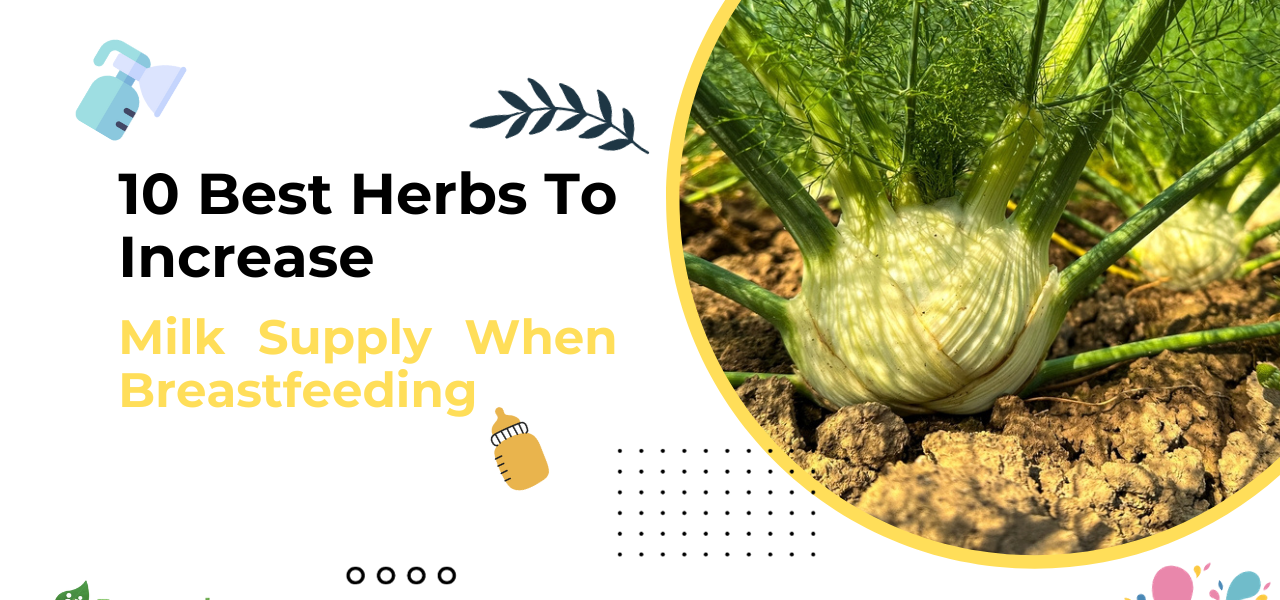10 Best Herbs To Increase Milk Supply When Breastfeeding
Breastfeeding is a beautiful and essential journey for both mothers and babies. However, some moms may face challenges with milk supply. Fortunately, there are natural remedies that can help enhance lactation. In this article, we’ll explore the 10 best breast milk production herbs for increasing milk supply while breastfeeding.
Why Herbs for Breast Milk Production?
Before delving into the herbs, let’s understand why some moms may need herbal assistance for milk production. Several factors can influence milk supply, including stress, hormonal imbalances, and insufficient feeding. Herbs have been used for centuries in various cultures to address these issues naturally.
Here are the 10 best breast milk production herbs for boosting breast milk production:
1. Fenugreek (Trigonella foenum-graecum)
Key Benefits: Fenugreek is a popular choice for increasing milk supply. It’s rich in phytoestrogens, which can mimic the hormone responsible for lactation.
How to Use: Consume fenugreek in capsule form or as a tea.
2. Blessed Thistle (Cnicus benedictus)
Key Benefits: Blessed thistle stimulates blood flow to the mammary glands, aiding milk production.
How to Use: Prepare blessed thistle tea or take it in supplement form.
3. Fennel (Foeniculum vulgare)
Key Benefits: Fennel is known for its digestive properties and can help alleviate gas in babies, making breastfeeding more comfortable.
How to Use: Enjoy fennel seeds in tea or as a culinary spice.
4. Milk Thistle (Silybum marianum)
Key Benefits: Milk thistle supports liver function, which indirectly influences milk supply.
How to Use: Available as a supplement, milk thistle can help detoxify your liver.
5. Alfalfa (Medicago sativa)
Key Benefits: Alfalfa is packed with vitamins and minerals, providing essential nourishment for both mom and baby.
How to Use: Consume alfalfa as a tea or in tablet form.
6. Goats Rue (Galega officinalis)
Key Benefits: Goats rue contains compounds that stimulate the growth of milk-producing mammary tissues.
How to Use: Typically available as a supplement, consult with a healthcare provider before use.
7. Anise (Pimpinella anisum)
Key Benefits: Anise is believed to have a mild estrogenic effect, which can enhance milk production.
How to Use: Enjoy anise seeds in your cooking or as a tea.
8. Shatavari (Asparagus racemosus)
Key Benefits: Shatavari is an Ayurvedic herb known for its lactation-boosting properties.
How to Use: Take Shatavari supplements or as directed by an Ayurvedic practitioner.
9. Red Raspberry Leaf (Rubus idaeus)
Key Benefits: Red raspberry leaf is rich in essential nutrients that can benefit the female reproductive system.
How to Use: Brew red raspberry leaf tea to enjoy its benefits.
10. Brewer’s Yeast
Key Benefits: Brewer’s yeast is a good source of B vitamins, which are important for lactation.
How to Use: Incorporate brewer’s yeast into your diet by sprinkling it on foods or using it in recipes.
Frequently Asked Questions (FAQs)
Q1: Are these herbs safe for breastfeeding moms and babies?
A1: In general, these herbs are considered safe when used in moderation. However, it’s essential to consult with a healthcare provider before incorporating them into your routine, especially if you have underlying medical conditions.
Q2: How quickly can I expect to see an increase in milk supply?
A2: The timeline varies for each individual. Some moms may notice a difference within a few days, while it may take longer for others.
Q3: Can I use multiple herbs at the same time?
A3: Yes, you can combine herbs, but it’s crucial to do so under the guidance of a healthcare professional to ensure proper dosages.
Q4: Are there any side effects associated with these herbs?
A4: Side effects are typically mild and include digestive discomfort. If you experience adverse reactions, discontinue use and consult a healthcare provider.
Q5: Can these herbs be used during pregnancy?
A5: Some of these herbs should be avoided during pregnancy. Always consult with a healthcare provider before use, especially if you are pregnant or planning to become pregnant.
Q6: What’s the best way to consume these herbs?
A6: Most herbs can be consumed as teas or supplements, but it’s essential to follow recommended dosages.
Q7: Are there foods I should avoid while trying to increase milk supply?
A7: Some moms find that certain foods like cabbage or peppermint can decrease milk supply, but this can vary from person to person.
Q8: Can I use these herbs in conjunction with other lactation-boosting techniques?
A8: Yes, combining herbal remedies with proper breastfeeding techniques and frequent nursing can be very effective.
Q9: What other lifestyle changes can help with milk supply?
A9: Staying hydrated, getting enough rest, and managing stress are essential for maintaining a healthy milk supply.
Q10: Are there herbs to avoid while breastfeeding?
A10: Some herbs, like sage and parsley, are known to decrease milk supply and should be consumed in moderation.
Conclusion
Enhancing milk supply when breastfeeding is possible with the help of natural herbs. However, it’s crucial to use these herbs cautiously and consult a healthcare provider if you have any concerns. Each person’s body is unique, and what works for one may not work for another. By combining these breast milk production herbs with proper breastfeeding techniques and a healthy lifestyle, you can support a successful breastfeeding journey for both you and your baby. For more parenting tips and resources, be sure to check out Parentology.





